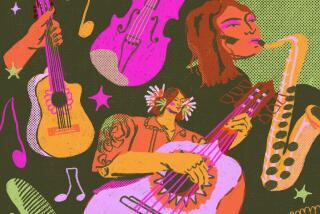Seeking a Change of Harp : Music: Alfredo Rolando Ortiz, who performs in San Juan Capistrano tonight, wants to broaden the instrument’s image beyond Harpo Marx.
CORONA — Mention the harp, Alfredo Rolando Ortiz believes, and most Americans conjure up images of Harpo Marx.
In his single-minded quest to change that image and broaden the instrument’s appeal, Ortiz operates something of a cottage industry out of his Corona home: self-produced CDs, cassettes and instructional videos, self-published books and private harp lessons. He also performs and lectures locally and internationally; he’ll give two free recitals tonight at the San Juan Capistrano Library.
In its small way, the approach is working, building pockets of harp enthusiasts in some unlikely places. For example, a few years back, Ortiz proposed a concert in desolate Yuma, Ariz.
“A harpist? In Yuma?” Ortiz, 44, says, mimicking the initial response. “To make the story short, I have now been six times in Yuma and sold out every time.”
It’s all a matter of exposure, says Ortiz, who performs on the Paraguayan harp: “I call it love at first hearing.”
Ortiz’s background is convoluted. Born in Cuba, he moved with his family to Venezuela, where he first began learning the Paraguayan harp. He moved to Colombia to study medicine and got a recording contract after his first public harp performance: a wedding reception whose guest list happened to include a recording executive.
He recorded for the label Codiscos from 1964 to 1984, producing 27 albums. He has since done another 10 albums on his own, which he distributes by mail order.
Like most Latin American harps, the arpa Paraguaya is based on Spanish harps of the 16th Century. It has 36 strings and no pedals and can be played either with the fingernails or the fingertips. Ortiz uses a dual technique. Contrasted with its better-known cousin, the classical harp, the arpa Paraguaya produces a sound that tends to be brighter and more rhythmic.
Ortiz says that Latin American styles can be “more spectacular in many ways” than classical harp. “At the same time,” he says, “it can be very delicate.”
The harp is an integral part of the musical tradition in Latin America, unlike in this country. “The harp is everyday music in Latin America,” Ortiz says. “If you go to a record store in Caracas (Venezuela) and ask for harp music, you will be directed to a big wall” of recordings.
Ditto in Paraguay: “You could almost say, without exception, that if there is no harp it is not Paraguayan music.” While the harp is traditionally a group instrument in South and Central America, Ortiz records and performs exclusively as a soloist.
Ortiz performs and composes in both traditional and classical veins. His work is admired by harpists of all styles, as he has been a featured soloist at numerous international harp festivals, capped by an opening night showcase at this year’s 10th Edinburgh Harp Festival International.
Last year, he performed at a festival in Japan and undertook a two-week concert tour of the island nation and found to his surprise that some cities there have associations such as Lovers of the Paraguayan Harp.
Ortiz came to the United States in 1975. He gave up his medical practice several years ago to concentrate on his music. “It was just too much,” he says. “It was either one or the other.”
He prefers not to tour extensively because he does not want to be apart from his wife and two daughters, ages 10 and 12. Working with the education department of the Los Angeles Music Center, he does frequent lecture-demonstrations at Southland grade schools, and was recently added to the educational touring roster of the California Arts Council.
Staying close to home is just one way Ortiz expresses his devotion to family. He has dedicated several compositions to his wife and children, but with the birth of his second daughter in 1980, he took things a step further--by performing in the delivery room.
Says Ortiz, “That’s the ultimate musical experience, as a composer and a performer.”
Harpist Alfredo Rolando Ortiz will perform at 7 and 9 p.m today at the San Juan Capistrano Regional Library, 31495 El Camino Real. Admission: free. Information: (714) 493-1752.
More to Read
Sign up for Essential California
The most important California stories and recommendations in your inbox every morning.
You may occasionally receive promotional content from the Los Angeles Times.










